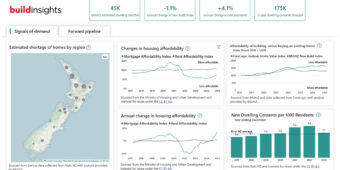TINY HOMES – CONSENT CONCERNS
14 Jan 2020, Builders business, News

Builders’ Business is a column by builders for builders. Its objective is to provide a forum, particularly for small business operators, in which to share knowledge, experience, tips and ideas
Q: What do you think about tiny homes on wheels and should they require a building consent?
Firm: Broswick Builders Limited
Principal: Todd Wickenden
Location: Auckland
Staff: 13
I definitely think tiny homes should require a building consent. I’ve seen a couple from the side of the road on some land while driving around. I think with people living in them, they should be up to code like any other building. That includes having appropriate materials, insulation, plumbing — all those things.
As far as people trying to classify them as vehicles, some of these tiny homes would struggle being towed behind a truck. If they’re fully operational as a vehicle, can withstand proper transport for decent distances, and have a Warrant of Fitness, then there’s an argument there. However, that shouldn’t mean that they can avoid being built correctly and using approved construction methods.
For people looking at owning a tiny home, I think they need to be careful to make sure it adheres to the Building Code and ensure it can be approved under any of the classifications they’re listing it under.
Firm: Glenn Grant Builders
Principal: Glenn Grant
Location: Nelson
Staff: 5
First off, I think tiny homes are a great idea. We’ve been involved in building small houses, not tiny homes, but houses that are only 80m2, with all the essentials, and more and more people seem interested in building houses with smaller footprints.
Many people look at building a tiny home because they want to save money. However, that sometimes involves trying to navigate around needing a consent. In my mind, this shouldn’t be allowed, as tiny homes incorporate most of the same structural elements as normal houses – framing, plumbing, weathertightness. Legally, all buildings need to comply with the Building Code, whether they need a consent or not, but if someone doesn’t get a building consent and these homes are so popular with people who may not be builders, how can a council ensure they are building to code?
Basically, just because it’s ‘tiny’ doesn’t mean it’s not a home, so it should have to adhere to the same regulations.
Firm: Karl Kampenhout Builder Limited
Principal: Karl Kampenhout
Location: Hamilton
Staff: 10
Tiny homes have a place in the construction environment and provide affordable housing for people seeking ways to enter the market. However, there’s obvious confusion. It appears councils are going different ways on regulating them, and builders and aspiring homeowners might look at one success somewhere but then run into issues with their respective council.
I believe tiny homes need to meet the same building and engineering compliance as regular builds require. A blanket rule that eliminates the confusion and standardises compliance rules would be beneficial.
I understand some tiny home building companies advertise that tiny homes don’t need consents because they’re vehicles, but from what I’ve seen, not many appear to be equipped for longdistance travel. Motorhomes must meet their own set of rules for compliance, so it could be worth having the same kind of thing for tiny homes that are claimed to be road-ready vehicles.
NOW HAVE YOUR SAY…
How do you feel about the government’s proposed reforms on modern methods of construction (also known as prefabricated building)?
Answer this questions to be in to enter our quarterly prize draw
Email your answer with your full name, contact phone number, company name, number of full-time staff and the city or town in which you’re based to editor@pmundersconstruction.co.nz. All responses must be submitted by 25 February 2020. The answers to this question will be published in Under Construction April/May 2020.
Register to earn LBP Points Sign in



